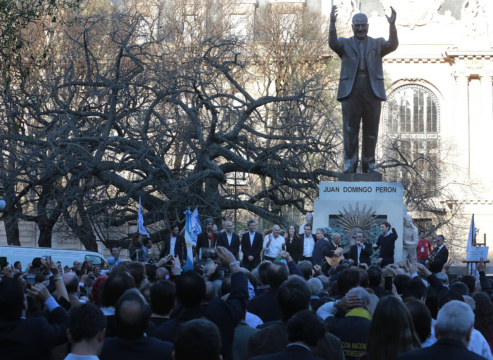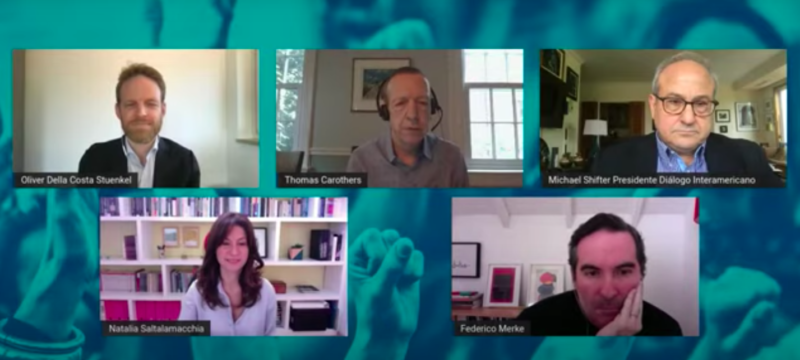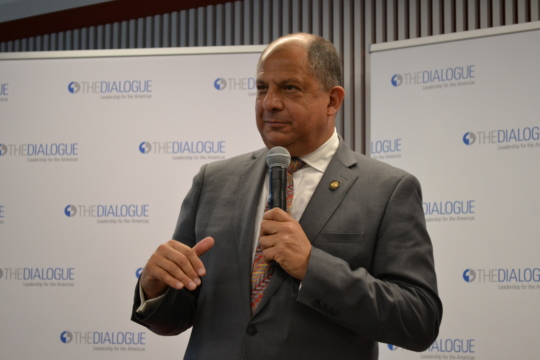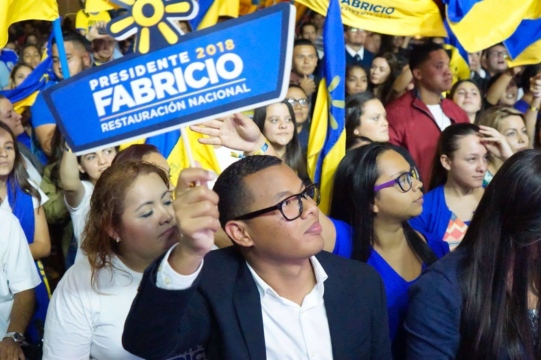
The Death of Populism?
Latin America’s left has every reason to be worried by current trends. Its power and credibility have declined sharply in many countries.
On July 20, 2021, the Inter-American Dialogue partnered with the Carnegie Endowment for International Peace to examine the arguments of the recent Carnegie working paper Reimagining Regional Governance in Latin America. The panelists discussed the existing challenges for fostering regional cooperation within Latin America as well as how regional cooperation can be reimagined to meet those challenges.
The webinar featured initial remarks and moderation from Thomas Carothers, interim president of the Carnegie Endowment for International Peace, and a main point summary from Oliver Stuenkel and Federico Merke, both authors of the working paper. The session also featured commentary from Michael Shifter, president of the Inter-American Dialogue, and Natalia Saltalamacchia, professor at the Department of International Relations of the Instituto Tecnológico Autónomo de México.
Federico Merke began the webinar by emphasizing that the primary intention of this working paper was not to focus on geopolitics or domestic political development, but rather to examine the challenges of regional cooperation within Latin America. When thinking about the factors that have limited regional cooperation, Merke demonstrated how the rise of both domestic crises and ideological polarization has played role in weakening the relationship between countries in Latin America. He later added that cooperation could be strengthened if Latin America acted as both the rule-taker and rule-maker of regional norms, and if bureaucracies developed instruments for technical cooperation that survived electoral cycles.
Oliver Stuenkel continued by stressing how regional cooperation is now more important than ever as the region faces critical challenges generated by the pandemic. Stuenkel outlined 10 concrete ideas that can help generate a constructive dialogue on rekindling regional cooperation in Latin America: focusing on the technical; going subnational when possible; putting brackets on toxic issues; encouraging smart engagement by the United States; going big on climate change; making great power competition more unifying rather than divisive; bridging Latin America’s north-south divide; focusing on the less glamorous hurdles to integration; favoring the minilateral over multilateral; and emphasizing the nongovernmental dimension.
The webinar moved on to commentary on the main arguments of the working paper. Natalia Saltalamacchia expressed agreeance to the notion that regional cooperation in Latin America is practically non-existent due to strong ideological divisions among governments that cause the deinstitutionalization of the original multilateral architecture. However, when looking at the effects of populism on regional cooperation, she advised the need to specify “what brand of national populism in Latin America” is at odds with regional cooperation. Populism does not imply the “re-treatment of international politics” nor does it imply an antagonism to multilateral organizations, as seen with the development of the Community of Latin American and Caribbean States under left-wing populist governments.
Michael Shifter continued with the commentary on the working paper by stating that the progression of regional cooperation within Latin America was relatively short-lived, an aspect which can be observed with the lack of regional response during the development of Plan Colombia. In addition, when looking at US involvement within Latin America, Shifter pointed to how Trumpism has continued to influence policy regarding the region as the Biden administration continues to emphasize migration, specifically from Central America, due to increasing domestic concerns. This has caused the Biden administration to only look at Latin America through the lens of a specific region rather than holistically.
The event concluded with a reflection from both Merke and Stuenkel reagarding the comments made by both Shifter and Saltalamacchia. Stuenkel agreed with Shifter that regional cooperation within Latin America has not been consistent, as exemplified during the 90s when many social and political difficulties were not met with regional condemnation. However, Merke highlighted how climate change could be a mechanism to work against this challenge, citing how conversations about climate change within Argentina are not specific to one single ideology. While the future of regional cooperation within Latin America seems pessimistic, the working paper attempts to shine some light on what can be done in the near future.
Latin America’s left has every reason to be worried by current trends. Its power and credibility have declined sharply in many countries.
On March 16th the Dialogue welcomed the President of Costa Rica, Luis Guillermo Solís. With persistent problems of crime and violence, ongoing migration challenges, lackluster regional economic growth, continuing concerns about corruption in many countries, and uncertainties about the new US administration’s policies, Central America faces a complicated and unsettled situation. President Solís discussed these issues and several others during this open discussion at The Dialogue.
En la segunda vuelta, los ciudadanos se enfrentan a una encrucijada que permitirá ver el futuro de América Latina: elegir a un diputado y cantante evangélico o al candidato del impopular partido en el poder.
 Carnegie Endowment for International Peace / YouTube
Carnegie Endowment for International Peace / YouTube

